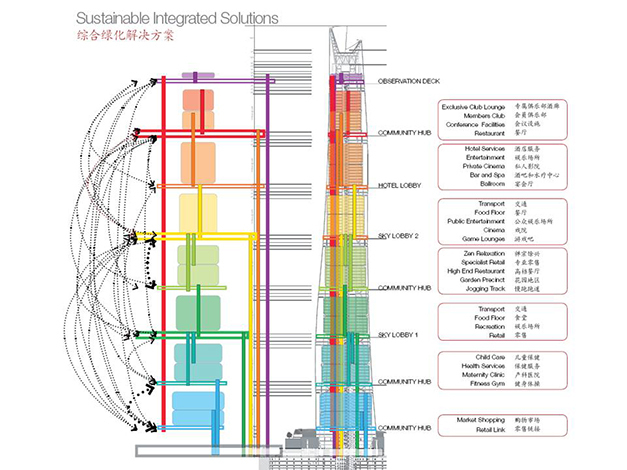Power Needed!!
 A fully loaded, slow-moving freight elevator has a cab with total mass of 1200 kg, which is required to travel upward 54 m in 3.0 min, starting and ending at rest. The elevator's counter-weight has a mass of only 950 kg, and so the elevator motor must help. What average power (in Watts) must be generated by the motor to move the elevator?
A fully loaded, slow-moving freight elevator has a cab with total mass of 1200 kg, which is required to travel upward 54 m in 3.0 min, starting and ending at rest. The elevator's counter-weight has a mass of only 950 kg, and so the elevator motor must help. What average power (in Watts) must be generated by the motor to move the elevator?
Image credit: Gensler
The answer is 7.4E+2.
This section requires Javascript.
You are seeing this because something didn't load right. We suggest you, (a) try
refreshing the page, (b) enabling javascript if it is disabled on your browser and,
finally, (c)
loading the
non-javascript version of this page
. We're sorry about the hassle.
8 solutions
P=W/t and W=mgh
iam not under standing why we subtract << i think that 1200+950
Log in to reply
power = work done /time taken SI unit = JS^-1 so we will use gravitational potential energy as the lift goes up and down not left or right(accelerating) so gpe=mgh mass x gravitational pull x height = 950kg x 10 ms^-2 x 54m =513000J use it in power's formula which is p=w/t= 513000J/180s=2850JS-1 which is = to 2850watts (W)
power = work done /time taken SI unit = JS^-1 so we will use gravitational potential energy as the lift goes up and down not left or right(accelerating) so gpe=mgh mass x gravitational pull x height = 950kg x 10 ms^-2 x 54m =513000J use it in power's formula which is p=w/t= 513000J/180s=2850JS-1 which is = to 2850watts (W)
Power is not measured in Joules. Fix it.
The mass of the counter weight cancels out most of the mass of the lift. Thus the motor has to lift only (1200-950=250)Kg.
Now,
P=W/t
=>P=mgh/t
=>P=(250x9.81x54)/(3x60)
=>P=735.75
P=Force * avg velocity
Avg velocity = total disp/total time = 54/180
so, power = (1200-950=250)*9.81 * (54/180)=735.75
First calculate the force which would be mg,1200-950=250 so 250 9.5m/s^2=2450 Now, P=W/t =mgh/time finally 2450 54/180=735Joules
THE POTENTIAL ENERGY OF THE CART TA THE TOP IS mgh =(1200)(9.81)(54) J. THIS ENERGY COMES FROM THE POTENTIAL ENERGY OF THE COUNTER WEIGHT i.e( 950)(9.81)(54) J PLUS THE ENERGY PROVIDED BY THE MOTOR. HENCE THE ENERGY PROVIDED BY THE MOTOR IS (250)(9.81)(54) J. NOW POWER IN WATTS IS ENERGY DISSIPATED PER SECOND. HENCE POWER = (250)(9.81)(54)/180 = 735.75 WATTS
Mg=mg+F,where M=mass of cab,m=counter mass and f=force provided by motor,g=gravity. v=s/t. where s is the upward distance and t is the time taken to reach upward(in secs) P=Fvwhere P is power
Here, Work done= mgh, where m= (1200-950)kg, g=9.8 m/s*s , h=54m, Time (t)=3 min Power = Work done / t= 735 J
Given: Mass1=1200 kg; Mass2= 950 kg; Distance=54 m; Time= 3 min = 3(60) =180 secs
Formula: Power=(Force*Distance)/Time
Solution: Power1 is power required to move the freight up to final position; Power2 is power supplied by the counterweight; Power3 is power supplied by the motor
- Power1=Power2 +Power3
- [(Mass1)(9.806)(Distance)/(Time)]=[(Mass2)(9.806)(Distance)/(Time)] + Power3
- [(1200)(9.806)(54)/(180)]=[(950)(9.806)(54)/(180)] + Power3
- 3530.16=2794.71 + Power3
- Power3=735.45
i think that is right
power = work done /time taken SI unit = JS^-1 so we will use gravitational potential energy as the lift goes up and down not left or right(accelerating) so gpe=mgh mass x gravitational pull x height = 950kg x 10 ms^-2 x 54m =513000J use it in power's formula which is p=w/t= 513000J/180s=2850JS-1 which is = to 2850watts (W)
I can understand your method..
As the counter-weight can lift 950 kg, the motor has to lift up the remaining 250 kg. Now, W = F.s So, W = 250 . 9.8 . 54J Time t = 3 . 60s = 180s Therefore, Power, P = 250 . 9.8 . 54/180 = 735J